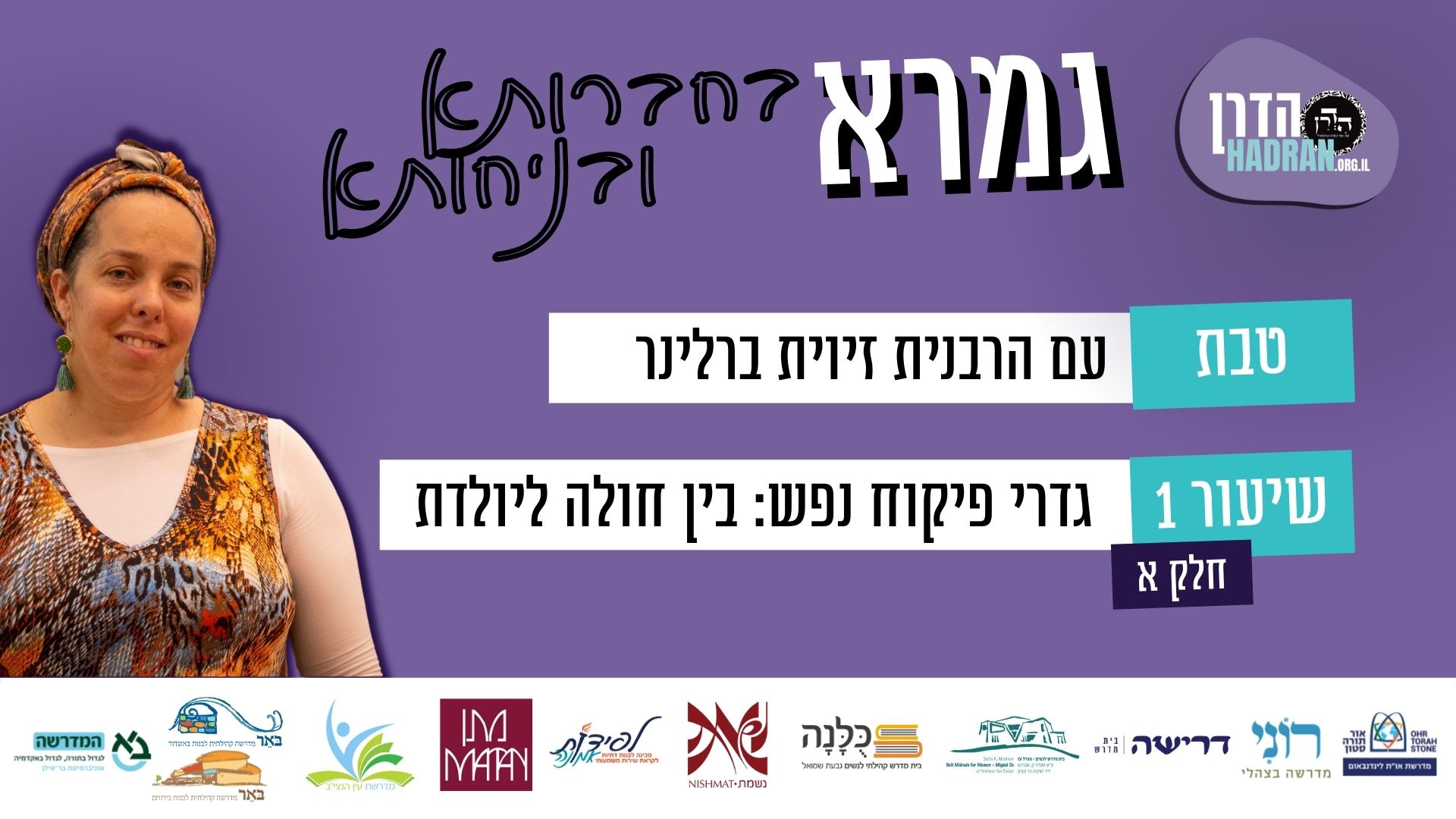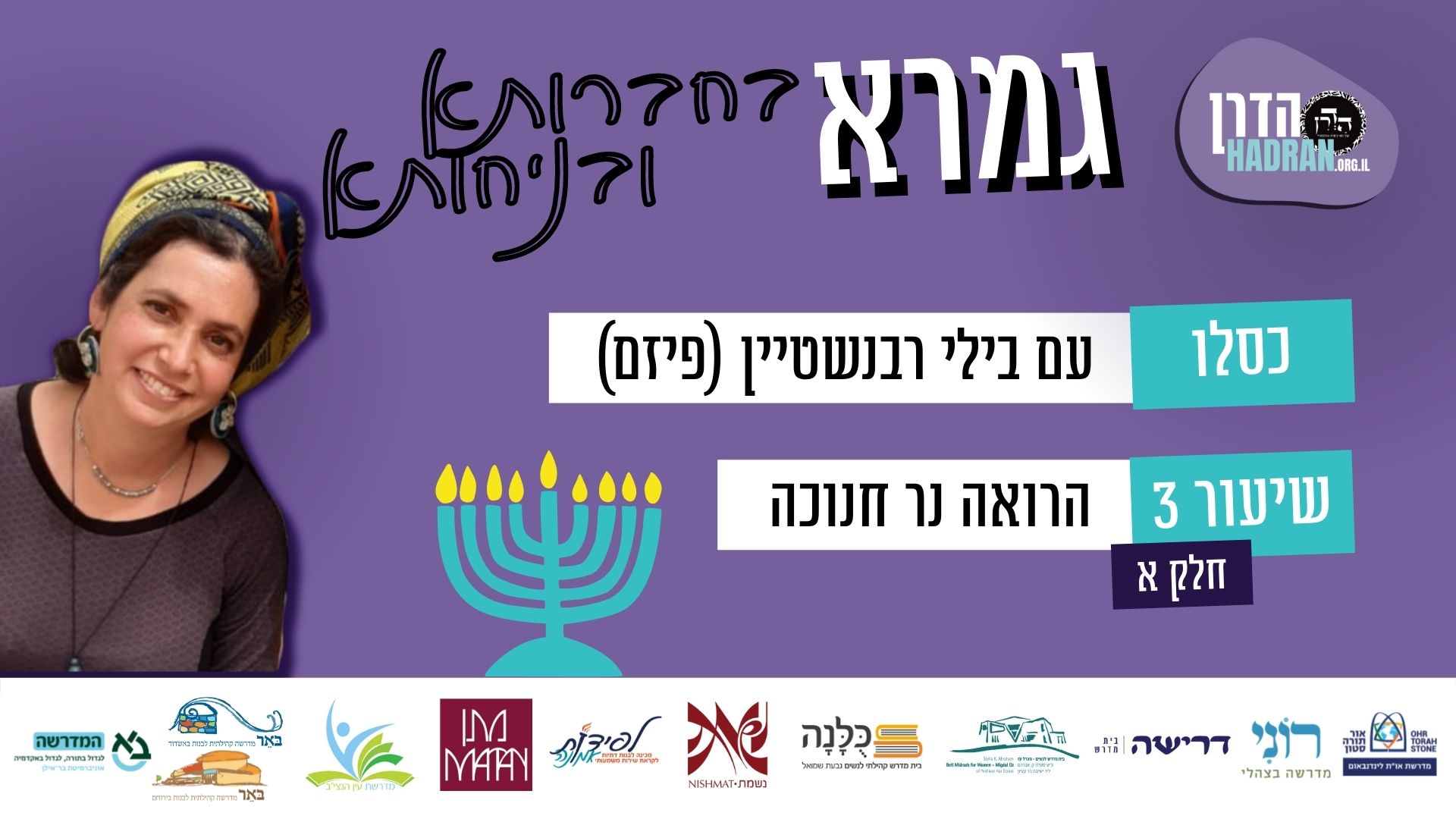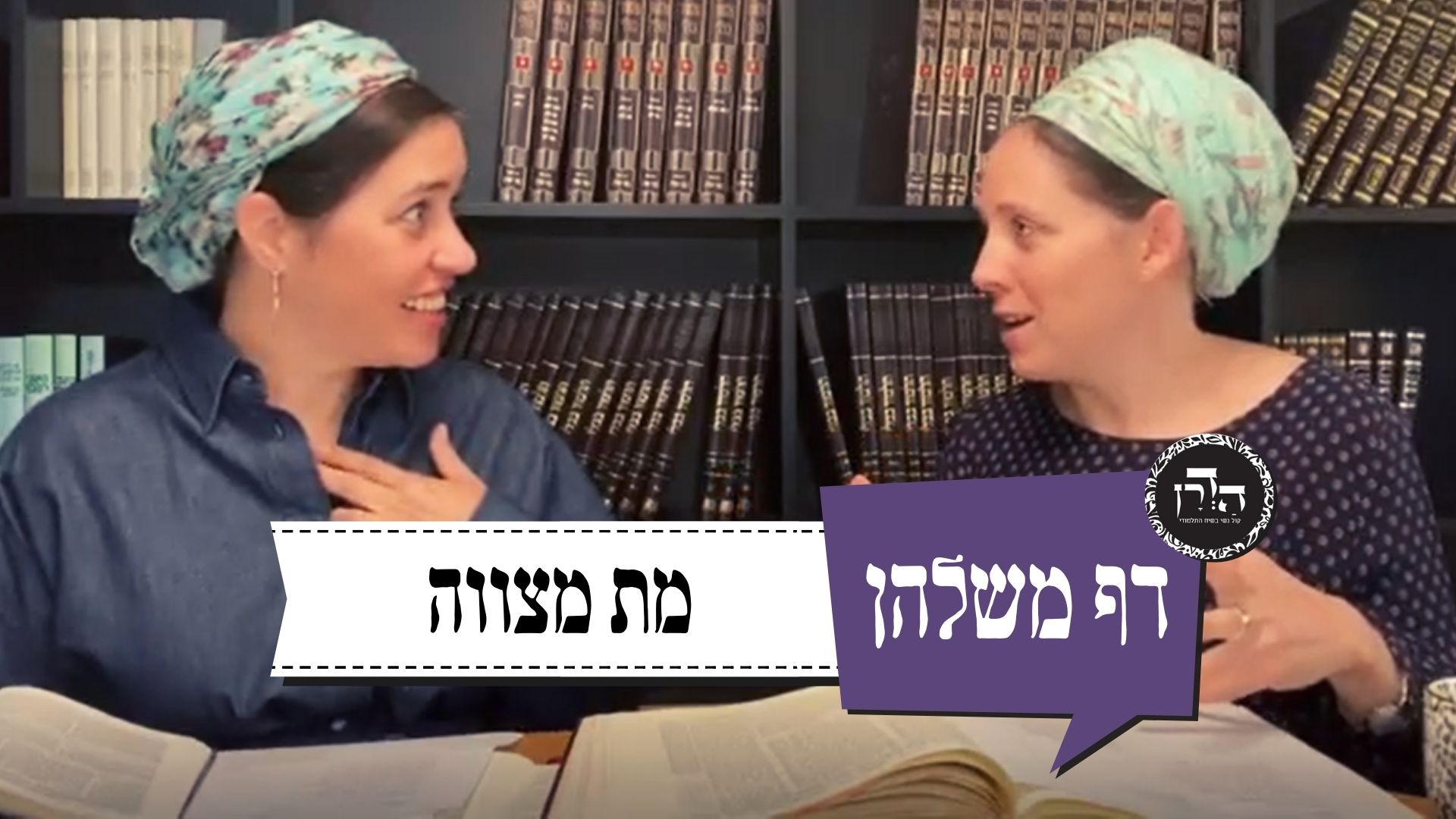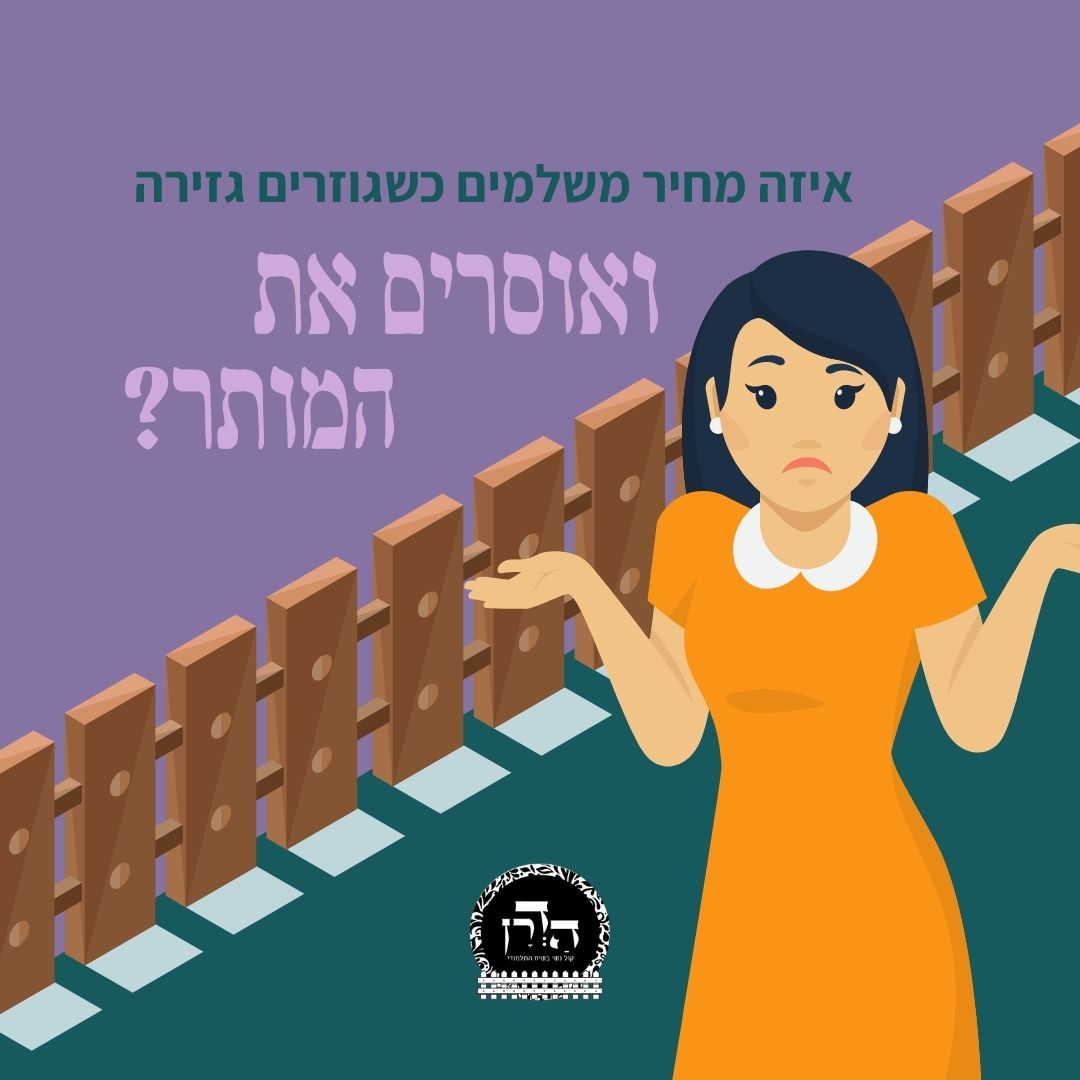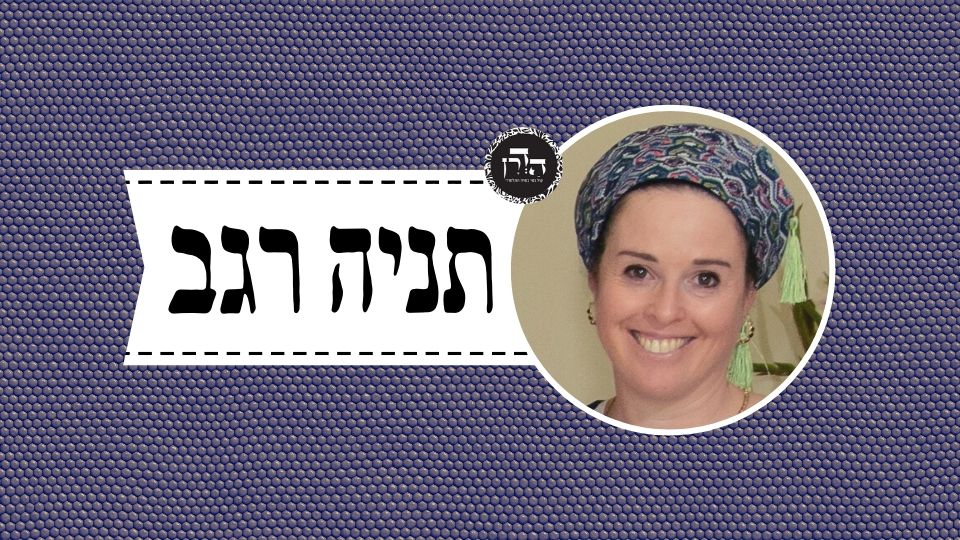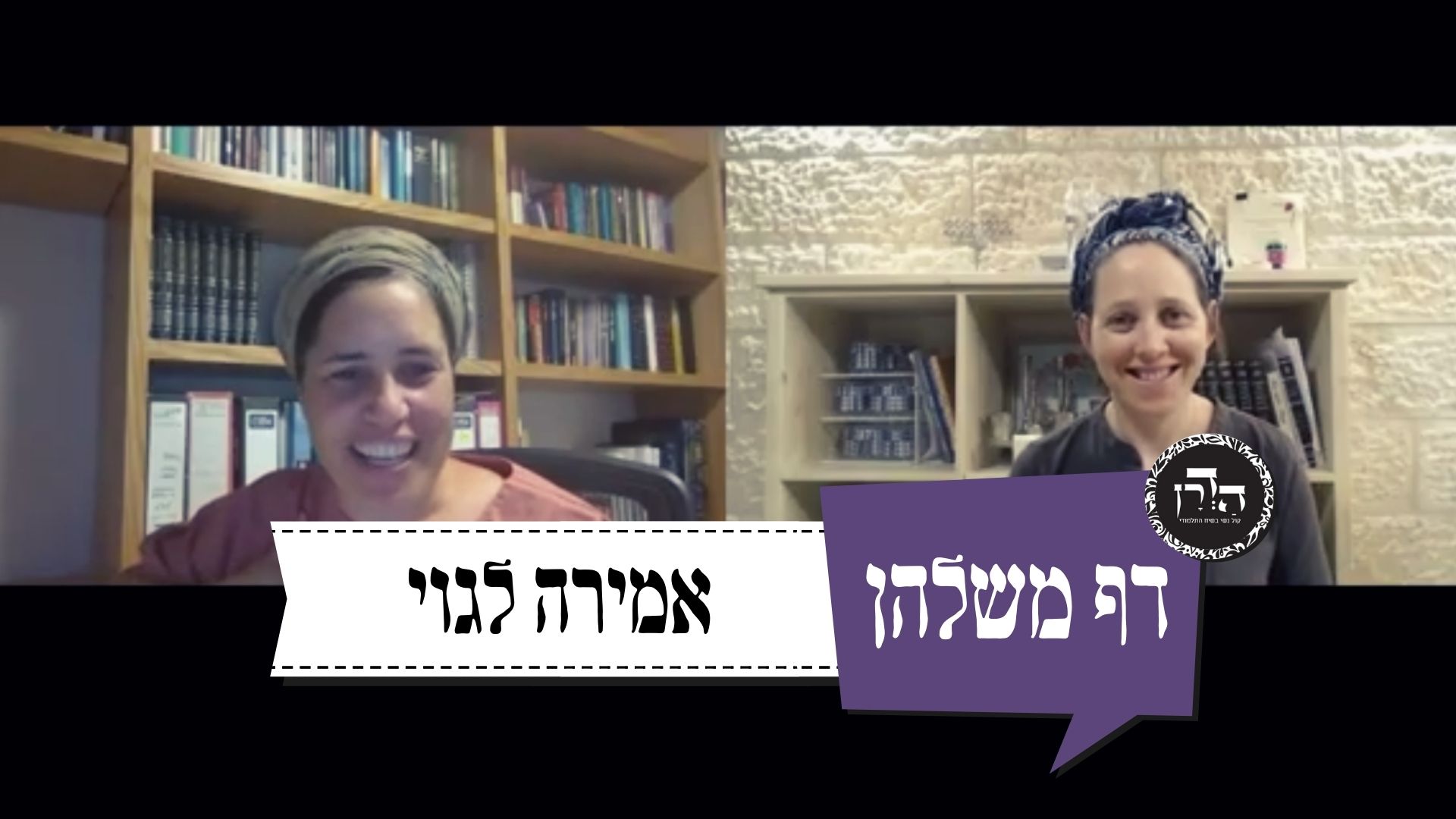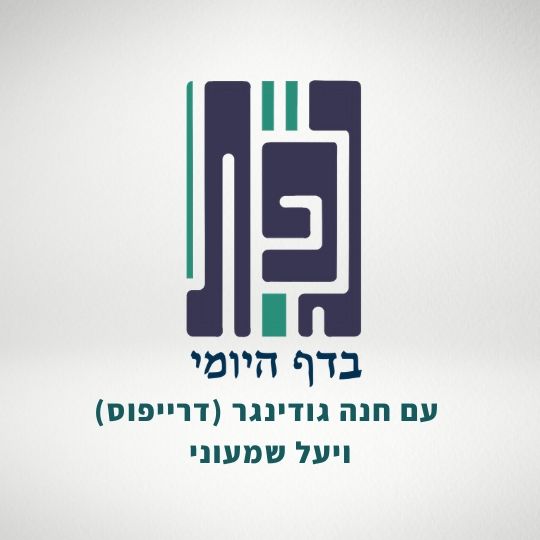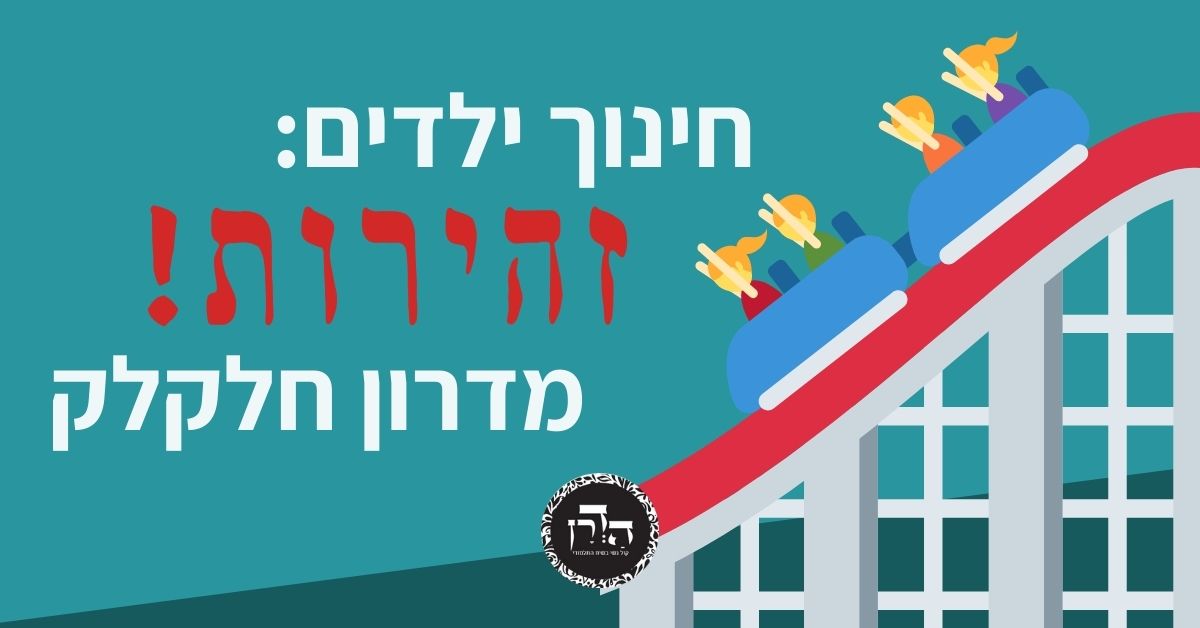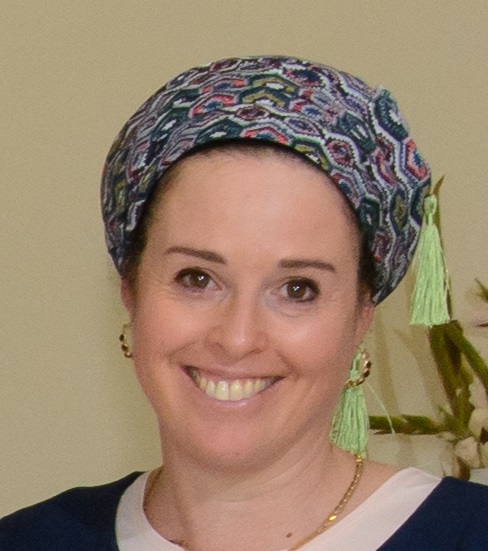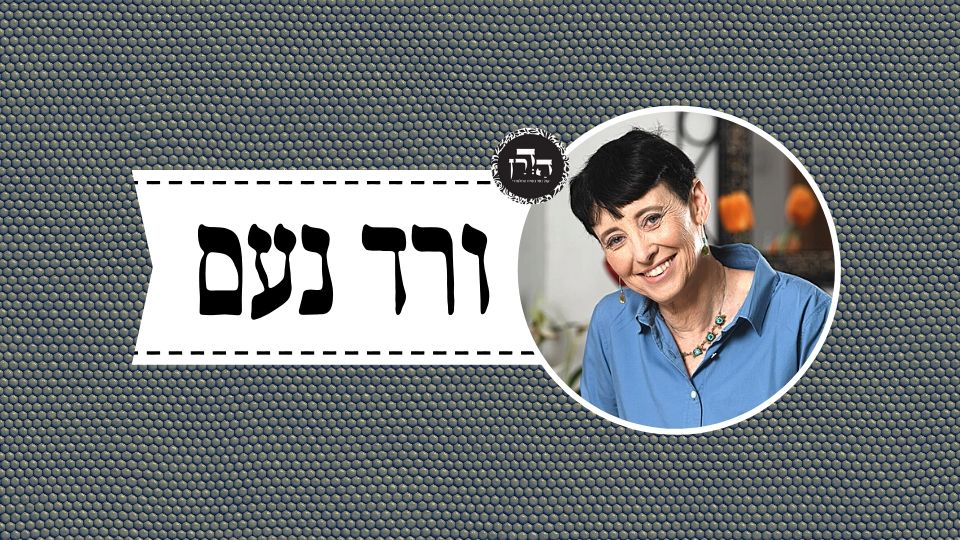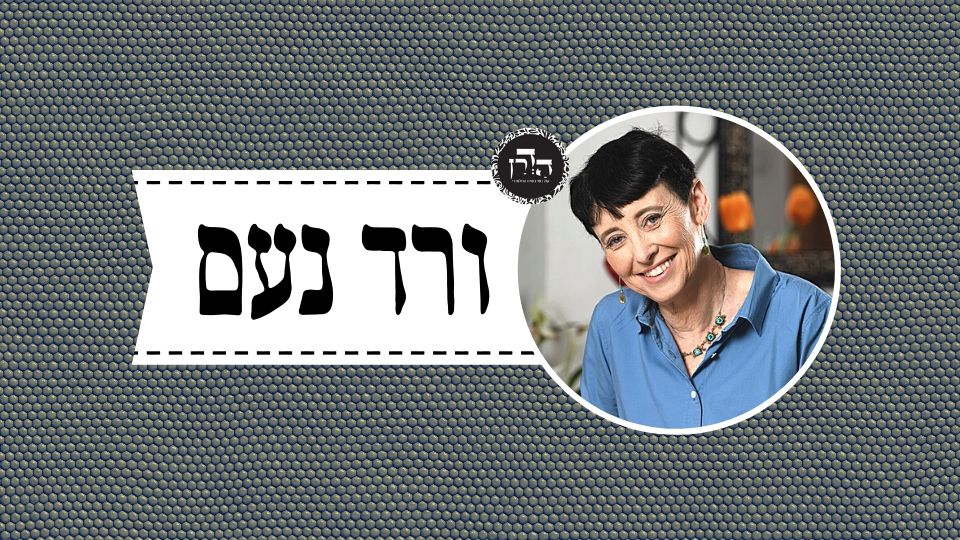שבת מה
הָכִי נָמֵי מִיסְתַּבְּרָא דְּרַב כְּרַבִּי יְהוּדָה סְבִירָא לֵיהּ, דְּאָמַר רַב: מַנִּיחִין נֵר עַל גַּבֵּי דֶּקֶל בְּשַׁבָּת, וְאֵין מַנִּיחִין נֵר עַל גַּבֵּי דֶּקֶל בְּיוֹם טוֹב. אִי אָמְרַתְּ בִּשְׁלָמָא דְּרַב כְּרַבִּי יְהוּדָה סְבִירָא לֵיהּ — הַיְינוּ דְּשָׁנֵי בֵּין שַׁבָּת לְיוֹם טוֹב. אֶלָּא אִי אָמְרַתְּ כְּרַבִּי שִׁמְעוֹן סְבִירָא לֵיהּ, מָה לִי שַׁבָּת וּמָה לִי יוֹם טוֹב?
The Gemara adds: So too, it is reasonable to say that Rav holds in accordance with the opinion of Rabbi Yehuda, as Rav said: One may place a lamp atop a palm tree on Shabbat eve to burn on Shabbat, and one may not place a lamp atop a palm tree on a Festival. Granted, if you say that Rav holds in accordance with the opinion of Rabbi Yehuda in this matter; that is why there is a distinction between Shabbat and a Festival. Since the lamp is set-aside [muktze] on Shabbat one will not come to carry it. Since one is permitted to carry a lamp on a Festival, there is concern that one might climb the palm tree or make use of the tree on the Festival and thereby transgress the rabbinic prohibition against making use of something connected to the ground on a Festival. However, if you say that Rav holds in accordance with the opinion of Rabbi Shimon, who maintains that the lamp is not set-aside even on Shabbat, what difference is there to me between Shabbat and a Festival? Ostensibly, there should be no distinction between the two.
וְרַב כְּרַבִּי יְהוּדָה סְבִירָא לֵיהּ? וְהָא בְּעוֹ מִינֵּיהּ דְּרַב מַהוּ לְטַלְטוֹלֵי שְׁרָגָא דַחֲנוּכְּתָא מִקַּמֵּי חַבָּרֵי בְּשַׁבְּתָא, וַאֲמַר לְהוּ: שַׁפִּיר דָּמֵי! — שְׁעַת הַדְּחָק שָׁאנֵי. דְּהָא אֲמַרוּ לְהוּ רַב כָּהֲנָא וְרַב אָשֵׁי לְרַב: הָכִי הִלְכְתָא? אֲמַר לְהוּ: כְּדַי הוּא רַבִּי שִׁמְעוֹן לִסְמוֹךְ עָלָיו בִּשְׁעַת הַדְּחָק.
The Gemara asks: And does Rav really hold in accordance with the opinion of Rabbi Yehuda that it is prohibited to move an object that is set-aside? Didn’t they raise a dilemma before Rav: What is the ruling with regard to moving a Hanukkah candle from before the ḥabarei, Persian Zoroastrian fire priests, on Shabbat? Those priests prohibited lighting fires on certain days. In order to prevent them from discovering that he lit Hanukkah candles it was necessary to quickly move them. And he said to them: One may well do so. Apparently, Rav does not hold that there is a prohibition of set-aside. The Gemara answers: This is not a proof, as exigent circumstances are different and Rav permitted this due to the danger involved. As Rav Kahana and Rav Ashi said to Rav on this matter: Is that the halakha? He said to them: Rabbi Shimon is worthy to rely upon in exigent circumstances like this one.
בְּעָא מִינֵּיהּ רֵישׁ לָקִישׁ מֵרַבִּי יוֹחָנָן: חִטִּים שֶׁזְּרָעָן בְּקַרְקַע, וּבֵיצִים שֶׁתַּחַת תַּרְנְגוֹלֶת — מַהוּ? כִּי לֵית לֵיהּ לְרַבִּי שִׁמְעוֹן מוּקְצֶה — הֵיכָא דְּלָא דַּחְיֵיהּ בְּיָדַיִם, הֵיכָא דְּדַחְיֵיהּ בְּיָדַיִם — אִית לֵיהּ מוּקְצֶה, אוֹ דִילְמָא לָא שְׁנָא. אֲמַר לֵיהּ: אֵין מוּקְצֶה לְרַבִּי שִׁמְעוֹן אֶלָּא שֶׁמֶן שֶׁבַּנֵּר בְּשָׁעָה שֶׁהוּא דּוֹלֵק, הוֹאִיל וְהוּקְצָה לְמִצְוָתוֹ הוּקְצָה לְאִיסּוּרוֹ.
On this same matter Reish Lakish raised a dilemma before Rabbi Yoḥanan: Wheat kernels that he sowed in the ground that have not yet taken root and he could still gather them, and eggs that were placed beneath the hen and the incubation process has begun, what is the halakha in these cases? Would Rabbi Shimon agree that in these cases it is prohibited for use on Shabbat? One side of the dilemma is: When is Rabbi Shimon not of the opinion that there is a prohibition of set-aside? In a case where one did not reject the object with his own hands, i.e., he did not perform an action setting the object aside. However, in a case where he rejected it with his own hands, he is of the opinion that there is a prohibition of set-aside. When he sowed the wheat, he rejected it with his own hands. The same is true with regard to the egg; by placing it under the hen to hatch, he actively rejected it. The other side of the dilemma is: Or, perhaps there is no difference between the cases and Rabbi Shimon holds that there is no prohibition of set-aside in either case. Rabbi Yoḥanan said to him: There is only a prohibition of set-aside, according to Rabbi Shimon, in the case of oil that is in the lamp while it is burning. Since it was set aside for its mitzva, the lighting of Shabbat candles, and it was also set aside for its prohibition, it is prohibited due to the concern that one might inadvertently extinguish the flame if he moves it while it is burning.
וְלֵית לֵיהּ הוּקְצָה לְמִצְוָתוֹ? וְהָתַנְיָא: סִיכְּכָה כְּהִלְכָתָהּ וְעִיטְּרָה בִּקְרָמִים וּבִסְדִינִין הַמְצוּיָּירִין, וְתָלָה בָּהּ אֱגוֹזִין, אֲפַרְסְקִין, שְׁקֵדִים וְרִמּוֹנִין, וּפַרְכִּילֵי עֲנָבִים, וַעֲטָרוֹת שֶׁל שִׁבּוֹלִין, יֵינוֹת, שְׁמָנִים וּסְלָתוֹת — אָסוּר לְהִסְתַּפֵּק מֵהֶן עַד מוֹצָאֵי יוֹם טוֹב הָאַחֲרוֹן. וְאִם הִתְנָה עֲלֵיהֶן — הַכֹּל לְפִי תְנָאוֹ.
The Gemara asks: And does he not hold that the prohibition of set-aside applies to an object set aside only for its mitzva without any prohibition? Wasn’t it taught in a baraita: One who roofed the sukka in accordance with its halakhic requirements and decorated it for aesthetic purposes with colored hangings and tapestries, and hung as decorations nuts, peaches, almonds and pomegranates, and grape branches, and wreaths made of stalks, wine, oils, and fine flour, it is prohibited to supply himself from them until the conclusion of the last day of the Festival. Since they were all set aside for the mitzva of sukka, all other uses are prohibited. And if one stipulated at the time that he hung them in the sukka that he is not designating them exclusively for this purpose, but he intends to use them for other purposes as well, their use is entirely in accordance with his stipulation. He is permitted to use them as he chooses.
וּמִמַּאי דְּרַבִּי שִׁמְעוֹן הִיא — דְּתָנֵי רַבִּי חִיָּיא בַּר יוֹסֵף קַמֵּיהּ דְּרַבִּי יוֹחָנָן: אֵין נוֹטְלִין עֵצִים מִן הַסּוּכָּה בְּיוֹם טוֹב אֶלָּא מִן הַסָּמוּךְ לָהּ. וְרַבִּי שִׁמְעוֹן מַתִּיר. וְשָׁוִין בְּסוּכַּת הַחַג בֶּחָג שֶׁהִיא אֲסוּרָה, וְאִם הִתְנָה עָלֶיהָ — הַכֹּל לְפִי תְנָאוֹ. כְּעֵין שֶׁמֶן שֶׁבַּנֵּר קָאָמְרִינַן, הוֹאִיל וְהוּקְצָה לְמִצְוָתוֹ הוּקְצָה לְאִיסּוּרוֹ. אִיתְּמַר נָמֵי, אָמַר רַבִּי חִיָּיא בַּר אַבָּא אָמַר רַבִּי יוֹחָנָן: אֵין מוּקְצֶה לְרַבִּי שִׁמְעוֹן אֶלָּא כְּעֵין שֶׁמֶן שֶׁבַּנֵּר בְּשָׁעָה שֶׁהוּא דּוֹלֵק, הוֹאִיל וְהוּקְצָה לְמִצְוָתוֹ הוּקְצָה לְאִיסּוּרוֹ.
And from where do we know that this unattributed baraita is in accordance with the opinion of Rabbi Shimon? We ascertained this from a comparison to a baraita that was taught by Rabbi Ḥiyya bar Yosef. As Rabbi Ḥiyya bar Yosef taught before Rabbi Yoḥanan: One may not take wood from the sukka that was constructed for shade on any Festival, even if the wood fell from the sukka on the Festival. Because it is prohibited to destroy the sukka on the Festival, it was set aside before the Festival for the entire duration of the Festival. Rather, one may take wood only from what is beside the sukka, i.e., bundles of wood that are not being used for the sukka. When he placed them there, his intention was to use them during the Festival. And Rabbi Shimon permits taking wood even from the sukka itself, since he holds that there is no prohibition of set-aside. And Rabbi Yehuda and Rabbi Shimon agree that taking wood from the sukka constructed for the Sukkot festival is prohibited during the Festival. And if one stipulated about the wood that he will be able to use it during the Festival, everything is in accordance with his stipulation. Apparently, Rabbi Shimon prohibits using an object that was set aside due only to a mitzva, even though it was not set aside due to a prohibition. Therefore, the Gemara emends Rabbi Yoḥanan’s statement: There is no halakha of set-aside according to Rabbi Shimon except in a case similar to oil in the candle. It is not necessary that there be both a prohibited labor and a prohibition due to the mitzva. Rather, since it was set aside for the mitzva alone, it is thereby set aside for the prohibition. It was also stated: Rabbi Ḥiyya bar Abba said that Rabbi Yoḥanan said: There is only a prohibition of set-aside according to Rabbi Shimon in a case similar to oil in the candle while it is burning; since it was set aside for its mitzva, it was set aside for its prohibition.
אָמַר רַב יְהוּדָה אָמַר שְׁמוּאֵל: אֵין מוּקְצֶה לְרַבִּי שִׁמְעוֹן אֶלָּא גְּרוֹגְרוֹת וְצִימּוּקִים בִּלְבַד. וּמִידִּי אַחֲרִינָא לָא? וְהָתַנְיָא: הָיָה אוֹכֵל בִּתְאֵנִים וְהוֹתִיר וְהֶעֱלָן לַגַּג לַעֲשׂוֹת מֵהֶן גְּרוֹגְרוֹת, בַּעֲנָבִים וְהוֹתִיר וְהֶעֱלָן לַגַּג לַעֲשׂוֹת מֵהֶן צִימּוּקִין — לֹא יֹאכַל עַד שֶׁיַּזְמִין. וְכֵן אַתָּה אוֹמֵר בַּאֲפַרְסְקִין וַחֲבוּשִׁין וּבִשְׁאָר כׇּל מִינֵי פֵּירוֹת.
Rav Yehuda said that Shmuel said: There is only a prohibition of set-aside according to Rabbi Shimon in the cases of dried figs and raisins alone. The case of one who takes figs and raisins up to his roof in order to dry them in the sun is the only situation in which Rabbi Shimon holds that they are prohibited on Shabbat due to the prohibition of set-aside. Since in the initial stages of the process they emit a bad odor and are unfit for consumption, one consciously sets them aside. The Gemara challenges: And other items are not included in the prohibition of set-aside? Wasn’t it taught in a baraita: One who was eating figs and left some over and took them up to the roof to make them into dried figs, and likewise one who was eating grapes and left some over and took them up to the roof to make them into raisins, one may not eat them on Shabbat unless he designates them to be eaten before Shabbat. Otherwise, they are prohibited as set-aside. And you would say the same with regard to peaches, and quinces, and all other types of fruit that one left out to dry. It is prohibited to eat them all on Shabbat due to set-aside.
מַנִּי? אִילֵימָא רַבִּי יְהוּדָה — וּמָה הֵיכָא דְּלָא דַּחְיֵיהּ בְּיָדַיִם אִית לֵיהּ מוּקְצֶה, הֵיכָא דְּדַחְיֵיהּ בְּיָדַיִם לֹא כׇּל שֶׁכֵּן?
The Gemara seeks to clarify: Whose opinion is it in the baraita? If you say that it is the opinion of Rabbi Yehuda, this baraita is superfluous. If in a case where one did not reject it with his own hands, he holds that there is a prohibition of set-aside, in a case where he rejected it by his own hand, all the more so that it is prohibited. There is no need to articulate the halakha in this unique case.
אֶלָּא לָאו רַבִּי שִׁמְעוֹן הִיא! לְעוֹלָם רַבִּי יְהוּדָה, וְאוֹכֵל אִצְטְרִיכָא לֵיהּ. סָלְקָא דַעְתָּךְ אָמֵינָא, כֵּיוָן דְּקָאָכֵיל וְאָזֵיל לָא לִיבְעֵי הַזְמָנָה. קָמַשְׁמַע לַן, כֵּיוָן דְּהֶעֱלָן לַגַּג אַסּוֹחֵי אַסְּחֵהּ לְדַעְתֵּיהּ מִינַּיְיהוּ.
Rather, isn’t this baraita in accordance with the opinion of Rabbi Shimon? Apparently, he expands the halakhot of set-aside beyond dried figs and raisins. The Gemara rejects this: Actually, this halakha is in accordance with Rabbi Yehuda who holds that there is a prohibition of set-aside. And the case cited here, where he was eating figs, is necessary in order to teach us a novel halakha. It may enter your mind to say that since one was in the course of eating, he does not require prior designation; and if he changed his mind he may immediately retrieve the dried figs that he placed on the roof. Therefore, the baraita teaches us that since he brought them up to the roof, he diverted his attention from them and they are completely set-aside.
בְּעָא מִינֵּיהּ רַבִּי שִׁמְעוֹן בַּר רַבִּי מֵרַבִּי:
On the same topic: Rabbi Shimon bar Rabbi Yehuda HaNasi, raised a dilemma before his father, Rabbi Yehuda HaNasi:
פַּצְעִילֵי תְמָרָה, לְרַבִּי שִׁמְעוֹן מַהוּ? אָמַר לוֹ: אֵין מוּקְצֶה לְרַבִּי שִׁמְעוֹן אֶלָּא גְּרוֹגְרוֹת וְצִימּוּקִין בִּלְבַד.
Unripe dates that are placed in baskets to ripen and until they are ripe can only be eaten with difficulty, according to the opinion of Rabbi Shimon, what is their legal status as far as moving them on Shabbat is concerned? Are they considered set-aside? Rabbi Yehuda HaNasi said to him: There is only a prohibition of set-aside according to Rabbi Shimon in the cases of dried figs and raisins alone.
וְרַבִּי לֵית לֵיהּ מוּקְצֶה? וְהָתְנַן אֵין מַשְׁקִין וְשׁוֹחֲטִין אֶת הַמִּדְבָּרִיּוֹת, אֲבָל מַשְׁקִין וְשׁוֹחֲטִין אֶת הַבַּיָּיתוֹת. וְתַנְיָא: אֵלּוּ הֵן מִדְבָּרִיּוֹת? — כׇּל שֶׁיּוֹצְאוֹת בַּפֶּסַח וְנִכְנָסוֹת בָּרְבִיעָה. בַּיָּיתוֹת — כׇּל שֶׁיּוֹצְאוֹת וְרוֹעוֹת חוּץ לַתְּחוּם, וּבָאוֹת וְלָנוֹת בְּתוֹךְ הַתְּחוּם. רַבִּי אוֹמֵר: אֵלּוּ וְאֵלּוּ בַּיָּיתוֹת הֵן. וְאֵלּוּ הֵן מִדְבָּרִיּוֹת: כׇּל שֶׁרוֹעוֹת בָּאֲפָר, וְאֵין נִכְנָסוֹת לַיִּשּׁוּב לֹא בִּימוֹת הַחַמָּה וְלֹא בִּימוֹת הַגְּשָׁמִים.
The Gemara challenges this: And does Rabbi Yehuda HaNasi not hold that there is a prohibition of set-aside? Didn’t we learn in a mishna that on a Festival, before they are slaughtered, one may neither give water to, in order to ease removal of their hides, nor slaughter non-domesticated, desert animals, animals that are always grazing in the fields? Since people do not generally tend to them, they are considered set-aside and may not be used. However, one may give water to and slaughter domesticated animals. And it was taught in a baraita that these are non-domesticated, desert animals: Any animals that leave their sheds on Passover and only enter their sheds with the advent of the rainy season. Domesticated animals are any animals that go out to graze beyond the city limits, and come and sleep within the city limits. Rabbi Yehuda HaNasi says: These and those are both domesticated. And these are the non-domesticated, desert animals that are prohibited due to the prohibition of set-aside: Any animals that graze in the grazing area and neither enter the town during the summer nor during the rainy season. It is these animals that it is prohibited to give water to or slaughter on a Festival. Apparently, Rabbi Yehuda HaNasi holds that there is a prohibition of set-aside even in the case of animals.
אִיבָּעֵית אֵימָא: הָנֵי נָמֵי כִּגְרוֹגְרוֹת וְצִימּוּקִין דָּמְיָין. וְאִי בָּעֵית אֵימָא: לִדְבָרָיו דְּרַבִּי שִׁמְעוֹן קָאָמַר לֵיהּ, וְלֵיהּ לָא סְבִירָא לֵיהּ.
Several resolutions are proposed to this contradiction: If you wish, say that these non-domesticated animals that graze in the grazing areas throughout the year are also considered like dried figs and raisins. Even Rabbi Shimon would agree to this halakha. And if you wish, say instead: When Rabbi Yehuda HaNasi told his son that answer, he was saying it to him in accordance with the opinion of Rabbi Shimon, and he himself does not hold that way.
וְאִיבָּעֵית אֵימָא, לְדִבְרֵיהֶם דְּרַבָּנַן קָאָמַר לְהוּ: לְדִידִי לֵית לִי מוּקְצֶה כְּלָל, לְדִידְכוּ אוֹדוּ לִי מִיהַת דְּהֵיכָא דְּיוֹצְאוֹת בַּפֶּסַח וְנִכְנָסוֹת בָּרְבִיעָה דְּבַיָּיתוֹת נִינְהוּ. וְרַבָּנַן? — אָמְרוּ לֵיהּ: לָא, מִדְבָּרִיּוֹת נִינְהוּ.
And if you wish, say instead: In that baraita, he spoke to them in accordance with the statement of the Rabbis, and this is how his statement must be understood: In my opinion I do not hold that there is a prohibition of set-aside at all. However, according to your opinion, at least agree with me that animals that leave their sheds on Passover and only enter their sheds with the advent of the rainy season are domesticated. And the Rabbis said to him: No, those are non-domesticated animals.
אָמַר רַבָּה בַּר בַּר חָנָה אָמַר רַבִּי יוֹחָנָן: אָמְרוּ הֲלָכָה כְּרַבִּי שִׁמְעוֹן. וּמִי אָמַר רַבִּי יוֹחָנָן הָכִי? וְהָא בְּעָא מִינֵּיהּ הָהוּא סָבָא קָרוֹיָא, וְאָמְרִי לַהּ, סָרוֹיָא מֵרַבִּי יוֹחָנָן: קִינָּהּ שֶׁל תַּרְנְגוֹלֶת מַהוּ לְטַלְטוֹלֵי בְּשַׁבָּת? אֲמַר לֵיהּ: כְּלוּם עָשׂוּי אֶלָּא לְתַרְנְגוֹלִין! הָכָא בְמַאי עָסְקִינַן — דְּאִית בֵּיהּ אֶפְרוֹחַ מֵת.
As to the essential dispute with regard to the laws of set-aside, Rabba bar bar Ḥana said that Rabbi Yoḥanan said: They said that the halakha is in accordance with the opinion of Rabbi Shimon who holds that there is no prohibition of set-aside. The Gemara asks: Did Rabbi Yoḥanan actually say this? Didn’t an Elder from Keruya, and some say that he was from Seruya, raise a dilemma before Rabbi Yoḥanan: With regard to a hen’s roost, what is its legal status as far as moving it on Shabbat is concerned? Rabbi Yoḥanan said to him: Isn’t the roost made exclusively for hens to be inside it? Since it is not designated for use by people, moving it is prohibited. Apparently, he holds in accordance with the opinion of Rabbi Yehuda with regard to set-aside. The Gemara answers: With what are we dealing here? With a special case, when there is a dead chick in the roost. Moving the roost is prohibited due to the dead chick, which is set-aside.
הָנִיחָא לְמָר בַּר אַמֵּימָר מִשְּׁמֵיהּ (דְּרַב) [דְּרָבָא] דְּאָמַר: מוֹדֶה הָיָה רַבִּי שִׁמְעוֹן בְּבַעֲלֵי חַיִּים שֶׁמֵּתוּ שֶׁאֲסוּרִין. אֶלָּא לְמָר בְּרֵיהּ דְּרַב יוֹסֵף מִשְּׁמֵיהּ דְּרָבָא דְּאָמַר: חָלוּק הָיָה רַבִּי שִׁמְעוֹן [אֲפִילּוּ] בְּבַעֲלֵי חַיִּים שֶׁמֵּתוּ שֶׁהֵן מוּתָּרִין, מַאי אִיכָּא לְמֵימַר? הָכָא בְּמַאי עָסְקִינַן — בִּדְאִית בֵּיהּ בֵּיצָה.
The Gemara continues to ask: This works out well according to the opinion of Mar bar Ameimar in the name of Rav, who said: Rabbi Shimon agreed in the case of animals that died on Shabbat, that they are prohibited on Shabbat due to set-aside. However, according to the opinion of Mar, son of Rav Yosef, in the name of Rava, who said: Rabbi Shimon was in disagreement even in the case of animals that died, and said that they are permitted and are not prohibited as set-aside, what can be said? The Gemara responds: With what are we dealing here? With a case where there is an egg that was laid on Shabbat in the roost. Because it was laid on Shabbat it is considered set-aside, and using the egg is prohibited. The thought of using it never entered anyone’s mind before Shabbat.
וְהָאָמַר רַב נַחְמָן: מַאן דְּאִית לֵיהּ מוּקְצֶה — אִית לֵיהּ נוֹלָד, דְּלֵית לֵיהּ מוּקְצֶה — לֵית לֵיהּ נוֹלָד! דְּאִית בֵּיהּ בֵּיצַת אֶפְרוֹחַ.
The Gemara asks: Didn’t Rav Naḥman say: One who is of the opinion that there is a prohibition of set-aside, is also of the opinion that there is a prohibition of an object that came into being on Shabbat or on a Festival; and one who is not of the opinion that there is a prohibition of set-aside, is also not of the opinion that there is a prohibition of an object that came into being. This case is no different than other cases of set-aside. The Gemara responds: This is referring to a case where the roost has an egg with a chick in it. Even Rabbi Shimon would agree that moving an egg of that sort is prohibited since it is fit for neither human nor animal consumption.
כִּי אֲתָא רַב יִצְחָק בְּרַבִּי יוֹסֵף אָמַר רַבִּי יוֹחָנָן: הֲלָכָה כְּרַבִּי יְהוּדָה. וְרַבִּי יְהוֹשֻׁעַ בֶּן לֵוִי אָמַר: הֲלָכָה כְּרַבִּי שִׁמְעוֹן. אָמַר רַב יוֹסֵף: הַיְינוּ דְּאָמַר רַבָּה בַּר בַּר חָנָה אָמַר רַבִּי יוֹחָנָן: אָמְרוּ הֲלָכָה כְּרַבִּי שִׁמְעוֹן. אָמְרוּ, וְלֵיהּ לָא סְבִירָא לֵיהּ.
This explanation was cited to explain that Rabbi Yoḥanan could hold in accordance with the opinion of Rabbi Shimon. However, when Rav Yitzḥak, son of Rabbi Yosef, came from Eretz Yisrael to Babylonia, he said that Rabbi Yoḥanan said: The halakha is in accordance with the opinion of Rabbi Yehuda that there is a prohibition of set-aside. And Rabbi Yehoshua ben Levi said: The halakha is in accordance with the opinion of Rabbi Shimon, that there is no prohibition of set-aside. Rav Yosef said: That is what Rabba bar bar Ḥana said that Rabbi Yoḥanan said: They said that the halakha is in accordance with the opinion of Rabbi Shimon. The inference is: They said; however, he himself does not hold that this is the halakha.
אָמַר לֵיהּ אַבָּיֵי לְרַב יוֹסֵף: וְאַתְּ לָא תִּסְבְּרַהּ דְּרַבִּי יוֹחָנָן כְּרַבִּי יְהוּדָה, הָא רַבִּי אַבָּא וְרַבִּי אַסִּי אִיקְּלַעוּ לְבֵי רַבִּי אַבָּא דְּמִן חֵיפָא, וּנְפַל מְנָרְתָּא עַל גְּלִימֵיהּ דְּרַבִּי אַסִּי וְלָא טַלְטְלַהּ. מַאי טַעְמָא? לָאו מִשּׁוּם דְּרַבִּי אַסִּי תַּלְמִידֵיהּ דְּרַבִּי יוֹחָנָן הֲוָה, וְרַבִּי יוֹחָנָן כְּרַבִּי יְהוּדָה סְבִירָא לֵיהּ, דְּאִית לֵיהּ מוּקְצֶה!
Abaye said to Rav Yosef: And you yourself did not hold that Rabbi Yoḥanan rules in accordance with the opinion of Rabbi Yehuda, even before Rav Yitzḥak came and cited this statement in his name? Didn’t Rabbi Abba and Rabbi Asi happen to come to the house of Rabbi Abba who was from the city Haifa, and a candelabrum fell onto Rabbi Asi’s cloak and he did not move it? What is the reason that he did not lift it? Is it not because Rabbi Asi was a student of Rabbi Yoḥanan, and Rabbi Yoḥanan holds in accordance with the opinion of Rabbi Yehuda, who holds that there is a prohibition of set-aside? Apparently, Rabbi Yoḥanan holds in accordance with the opinion of Rabbi Yehuda.
אֲמַר לֵיהּ: מְנָרְתָּא קָאָמְרַתְּ? מְנָרְתָּא שָׁאנֵי, דְּאָמַר רַבִּי אַחָא בַּר חֲנִינָא אָמַר רַבִּי אַסִּי: הוֹרָה רֵישׁ לָקִישׁ בְּצַיְדָּן: מְנוֹרָה הַנִּיטֶּלֶת בְּיָדוֹ אַחַת — מוּתָּר לְטַלְטְלָהּ, בִּשְׁתֵּי יָדָיו — אָסוּר לְטַלְטְלָהּ. וְרַבִּי יוֹחָנָן אָמַר: אָנוּ אֵין לָנוּ אֶלָּא בְּנֵר כְּרַבִּי שִׁמְעוֹן. אֲבָל מְנוֹרָה, בֵּין נִיטֶּלֶת בְּיָדוֹ אַחַת בֵּין נִיטֶּלֶת בִּשְׁתֵּי יָדָיו — אָסוּר לְטַלְטְלָהּ.
Rav Yosef said to Abaye: Candelabrum you say; are you citing a proof from the case of a candelabrum? A candelabrum is different because there is a unique halakha in that case. As Rabbi Aḥa bar Rabbi Ḥanina said that Rabbi Asi said that Reish Lakish issued a ruling in the city of Sidon: A candelabrum that can be moved in one of his hands, one is permitted to move it on Shabbat. However, if it is so heavy that one must move it with his two hands, it is prohibited to move it. And Rabbi Yoḥanan said: We have permission to carry only in the case of an oil lamp, according to the opinion of Rabbi Shimon. However, with regard to a candelabrum, both one that is carried in one hand and one that is carried in two hands, it is prohibited to move it.
וְטַעְמָא מַאי? רַבָּה וְרַב יוֹסֵף דְּאָמְרִי תַּרְוַויְיהוּ: הוֹאִיל וְאָדָם קוֹבֵעַ לָהּ מָקוֹם. אֲמַר לֵיהּ אַבָּיֵי לְרַב יוֹסֵף: וַהֲרֵי כִּילַּת חֲתָנִים דְּאָדָם קוֹבֵעַ לוֹ מָקוֹם, וְאָמַר שְׁמוּאֵל מִשּׁוּם רַבִּי חִיָּיא: כִּילַּת חֲתָנִים
The Gemara asks: And what is the reason that there is a unique prohibition in the case of a candelabrum? Rabba and Rav Yosef both said: Since a person usually designates a fixed place for it due to its size and its use, it is considered a built-in part of the house, and moving the candelabrum is like dismantling the house. Abaye said to Rav Yosef: A groom’s canopy is an object for which a person designates a set place, and, nevertheless, Shmuel said in the name of Rabbi Ḥiyya: With regard to a groom’s canopy,



